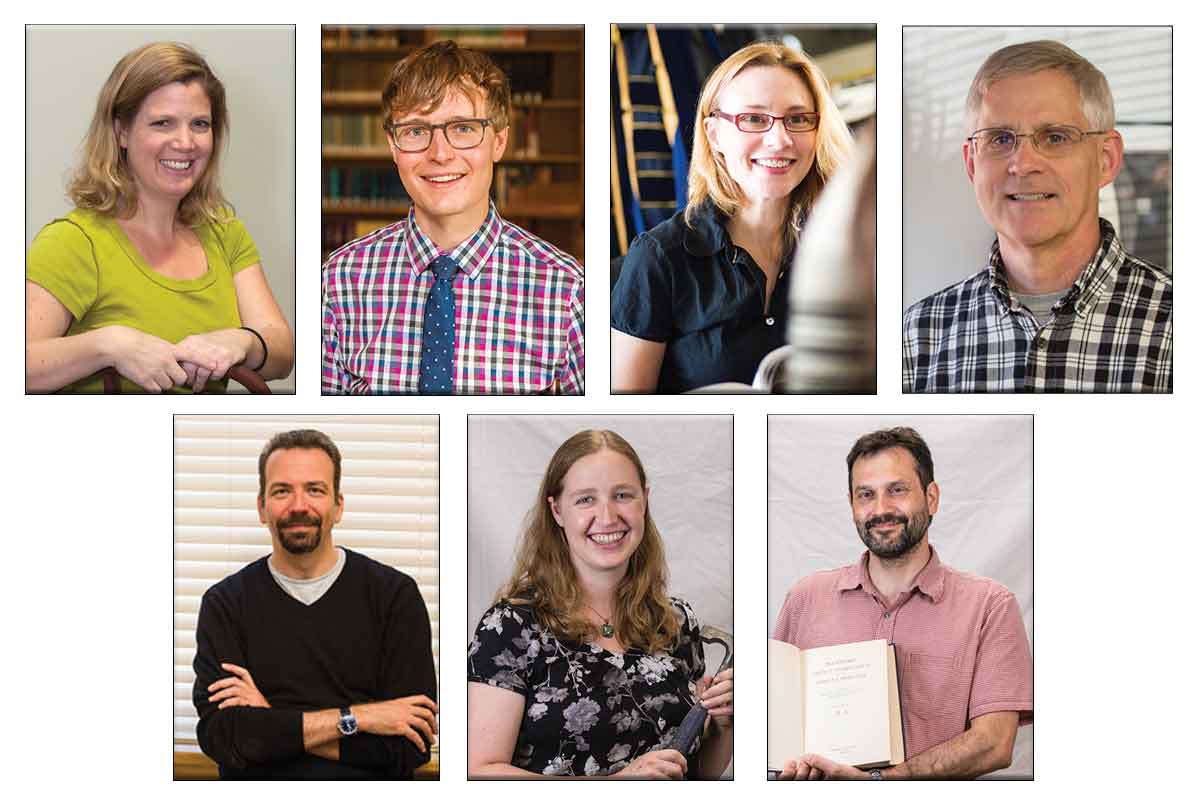
Seven members of the Knox faculty received promotions last June: Mitchell Parks received tenure and was promoted to associate professor, and Jennifer Smith, Katherine Adelsberger, Emily Anderson, Toni Prado, Jim Thrall, and Emre Sencer were promoted to full professors. We asked them to talk about their current research interests, recent adaptations to remote teaching, and their potential careers in alternate universes. Here’s what they had to say.
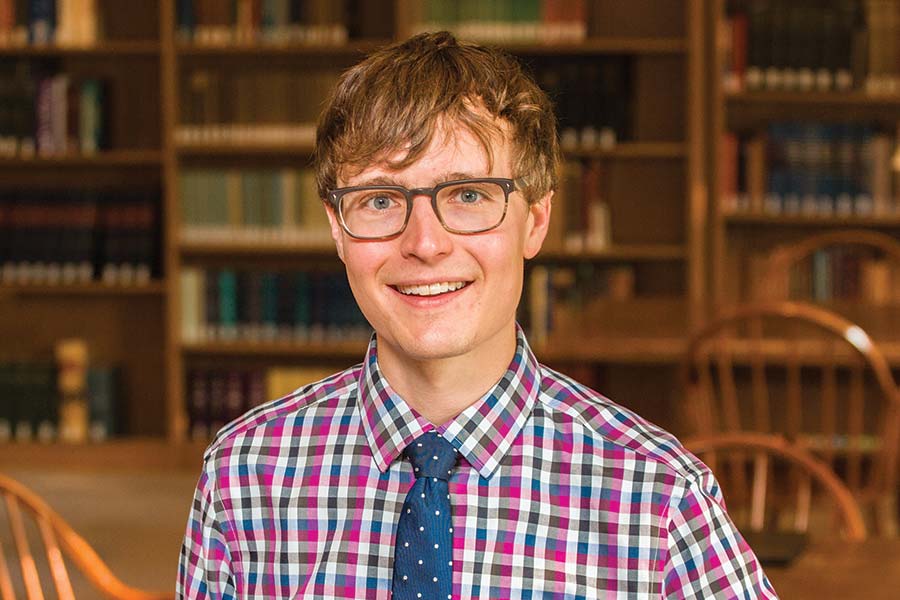
Associate Professor of Classics Mitchell Parks
Mitchell earned his doctorate from Brown University and his bachelor’s degree from Grinnell College. His research focuses on the literature of fourth-century BCE Athens, the time period when Athenian democratic institutions were the most elaborate and pervasive. The idea of reading texts in dialogue with each other permeates every class Mitchell teaches, especially his course The Classical World of Harry Potter, which puts the Harry Potter novels into conversation with several ancient texts and uses that conversation to ask the big questions “Is Harry Potter a classic?” and “What is a classic, anyway?” and “Is considering something a classic ultimately good or bad for society?”
If money and time were no object, what projects would you pursue (as a teacher and/or as a scholar)?
I'm torn in two directions on this one. On the one hand—money is no issue, right?—I'd start a foundation to advocate for more open and democratic political institutions, using insights from the laboratory of democratic experiment that is world history. On the other hand, and much less consequentially, I would also like to write a book based on the ideas and questions—mostly questions!—I've encountered in teaching my course on Harry Potter and the classics over the years.
What is your favorite thing about Galesburg?
What I like most about Galesburg is its relative walkability, compared to other midwestern towns of my experience: I'm a sucker for a city laid out on a grid, which is a plan that the ancient Greeks associated with democracy and civic engagement. Under normal (non-pandemic) circumstances, I walk to campus every day and value that walk both from an environmental standpoint—it means my household only needs one car—and personally, for the amount of mindfulness it adds to my day.
What is your most memorable moment at Knox?
I've had a lot of great experiences at Knox so far, but the single most meaningful event for me was in fall 2018. I co-ran the First-Year Preceptorial program, and that year all FP students read about the Theater of War project, which uses public readings of ancient Greek tragedies to inspire conversations about social issues. (Theater of War's ability to reach audiences has really exploded during the pandemic, and I encourage everyone to watch their website for upcoming virtual performances.) During the first week of classes, we followed the model of Theater of War and put together a reading of Euripides' Bacchae in Kresge, featuring faculty and student readers, for all FP students. The town hall discussion that followed proved how thoughtful and imaginative Knox students are, right from day one.
If you weren't a professor, what would you be?
I have this theory that most humanities professors secretly think that they could have (or even should have!) been lawyers, and the same is true for me: I care deeply about careful reading and the minute distinctions language makes possible, and law also has a great potential for promoting social good. But ultimately I prefer helping students develop their own thinking about language and social justice as my professional contribution to making the world a better place.
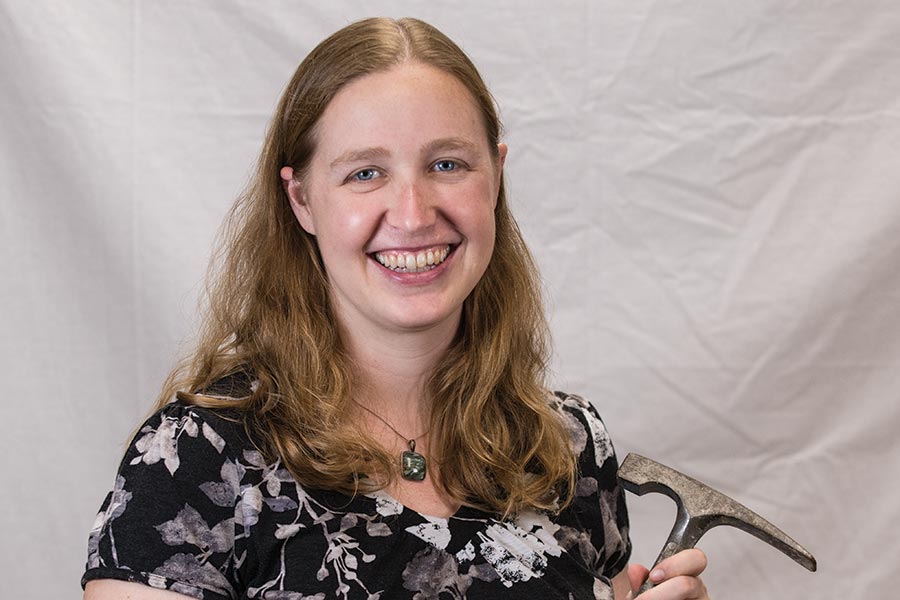
Professor and Chair of Environmental Studies; Douglas and Maria Bayer Endowed Chair in Earth Science Katherine Adelsberger
Katherine got her doctorate from Washington University in St. Louis and her bachelor’s degree from Beloit College. She co-directs an archaeological project in Jordan; she is usually there during the summer and brings back materials for analysis at Knox. She has also analyzed soil composition at Green Oaks and, this past summer, she worked with a research group to develop some methodologies for investigating microplastic presence in our local waterways.
How does your current research impact your teaching?
Research is teaching, it's just one-on-one or in small groups instead of in a classroom. I think this is the Knox ideal, that our students are also doing original research and collaborating with faculty on that process. In some of these contexts I'm more of a teacher, such as in Jordan at our field school, but in some contexts, particularly with local projects, students really take on their own portion of a larger question and I serve more as a guide than an instructor.
How did the restraints of the pandemic encourage growth for you as a person and as a professor?
The pandemic has obviously been a challenge; I have an elementary-aged daughter at home and having her out of school made it very difficult to balance everything. One of the things I think was beneficial for me in the end was being forced by this situation to really focus on my mental health and get help in that area when I needed it. I also found myself reconsidering some of my "standard" teaching practices, and I look forward to doing more flipped classrooms and putting less focus on in-class exams in the future.
What is your favorite thing about Galesburg?
It's small enough to feel like there's a community and it's easy to get around town, but it also has many of the features of a larger city such as great art, a children's museum, and regular community events.
What was something that surprised you during remote teaching?
The students were very forgiving and gracious about the struggles I was going through, while I tried to be flexible with them as well. I was surprised by how connected I still felt to the Knox community even via Zoom, just because the students took all the hiccups of spring 2020 in stride, and they didn't judge (at least out loud) when my daughter was disrupting my classes.
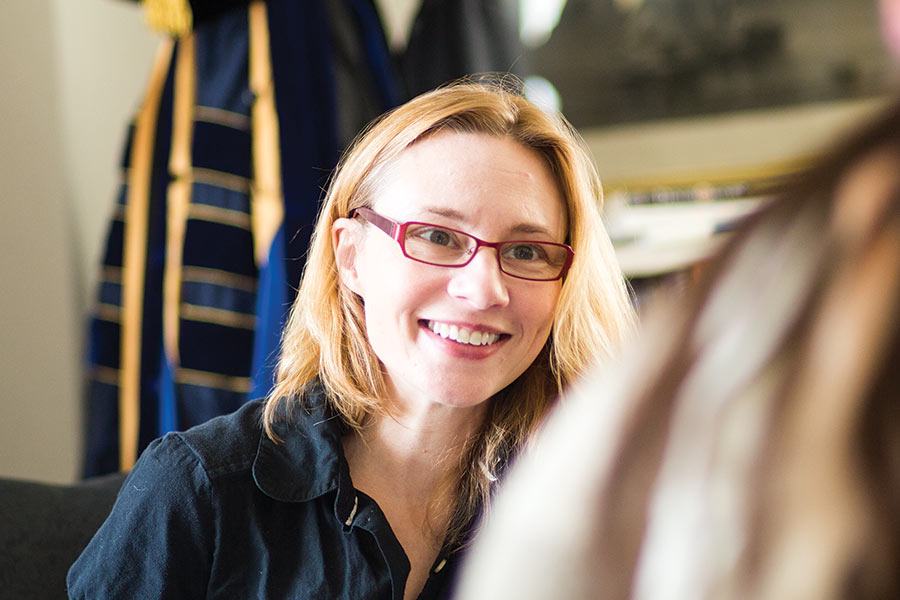
Professor of English and Chair of Film Studies Emily Anderson
Emily is currently finishing an article on the TV show Black Mirror and its relationship to the viewer. She earned her doctorate from the University of California, Berkeley, her master’s degree from Mills College, and her bachelor’s degree from Willamette University. In 2007, she was recognized by Knox College with the Philip Green Wright-Lombard College Prize for Distinguished Teaching, and she has published work such as "Telling Stories: Unreliable Discourse, Fight Club, and the Cinematic Narrator" in the Journal of Narrative Theory and "‘I Will Unfold a Tale-!': Ontology, Epistemology, and Caleb Williams" in Eighteenth-Century Fiction.
How does your current research impact your teaching?
This (Black Mirror) article is an extension of my course on film noir and the way noir positions the viewer. The television series has a lot in common with these films from the 1940s and 50s, and I'm determined to understand why. I have also used my recent course on Social Media and Social Justice to expand my research interests.
If money and time were no object, what projects would you pursue (as a teacher and/or scholar)?
Wow! If money, time, and personal responsibilities could be cast aside, I would study narratology in Paris at the Centre de Recherches sur les Arts et les Langages. Narrative theory looks very different in Europe than it does here, and I would love to bring new ways of thinking back to my classroom.
What is your most memorable moment at Knox?
My most recent memorable moment was learning that I got promoted. I was at an Honor's dinner with a student and some other faculty members, and President Amott and Provost Schneider happened to be at the same restaurant. They came over to my table to give me the news and to congratulate me. I immediately excused myself, with apologies to the student, and went outside to call my friends and family. I love that such fortuitous things can happen here!
What was something that surprised you during remote teaching?
Most surprising, and delightful, during remote teaching was that my students responded so well. Of course, it was a very difficult time for everyone, but the students were resilient, hopeful, and game for anything. The whole experience was much better than I thought it would be, and that was in large part because of the students.
Is there anything else you'd like to add?
Thank you for giving me a chance to share! It's one of the things I love most about Knox!
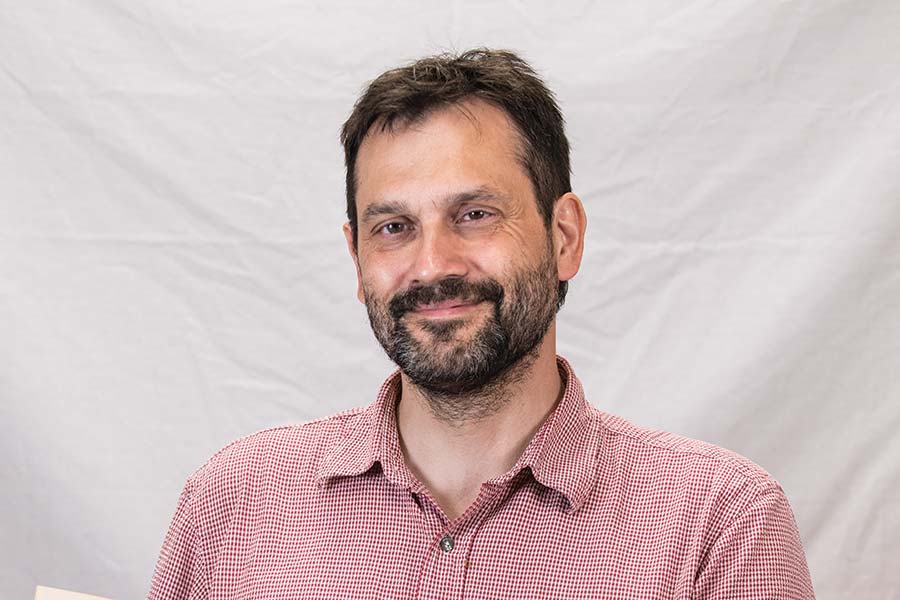
Professor of Modern Languages and Literatures (Spanish) Antonio Prado del Santo
Toni earned his doctorate, master’s, and bachelor’s degrees from the University of Illinois. Currently researching the legacy of the people who went into exile during the Spanish Civil War and planted roots in France. The Spanish Civil War and the influence of anarchist philosophy in Spanish life has been his main research topic. He also designed a travel course around these topics and led a group to Spain in 2014. Toni is also a member of both the Modern Language Association and the Society for Cinema and Media Studies.
If money and time were no object, what projects would you pursue (as a teacher and/or as a scholar)?
I would spend a year in France trying to get comfortably fluent in French, and I would travel to research the anarchist movements of the past and present in several countries in Latin America.
What is your favorite thing about Galesburg?
It has changed over time. I very much enjoyed raising my children here because of its humane scale, and, now that they are both adults, my favorite thing is to enjoy life outdoors, be it going downtown, taking walks in my neighborhood, or hiking in parks, like Lake Storey, Blackthorn Hill Nature Preserve. Through the pandemic, it has been such a calming feature of Galesburg living to me.
What was something that surprised you during remote teaching?
A few students really amazed me. They showed up every day with overflowing enthusiasm. I really fed on that energy to keep me going.
If you weren't a professor, what would you be?
Well, I once dreamt I would become a psychoanalyst. I still ponder that sometimes, about what it would have been like and if I would have been successful at that. However, a more realistic answer might be a high school teacher. I think I would really enjoy teaching history.
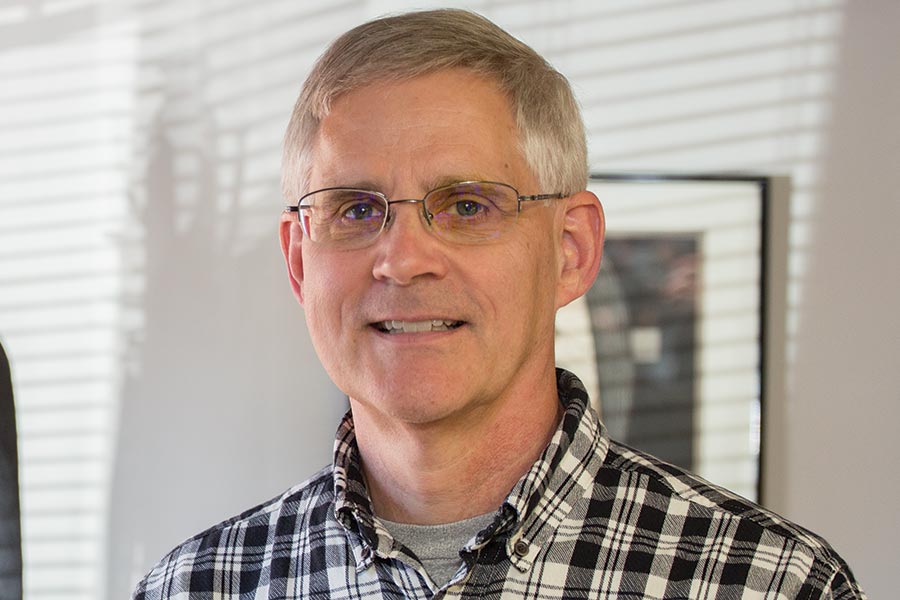
Knight Distinguished Professor for the Study of Religion & Culture James Thrall
Jim is currently working on a textbook for courses in Religion and Science Fiction, as well as on two articles related to that topic. His research has a direct connection to the Religion and Science Fiction course he teaches every few years, and also feeds into his more general interest in connections between religion and popular culture. He earned his doctorate from Duke University and his master’s and bachelor’s degrees from Yale University Divinity School and Colby College respectively.
How did the restraints of the pandemic encourage growth for you as a person and as a professor?
I spent the past year teaching remotely from my home in North Carolina, in part because it made it possible for my wife and me to bring my elderly father to live with us. Including him in our household, especially given the other restraints of the pandemic, introduced quite a number of changes to our routines that required learning new modes of adapting. Also, shifting so entirely to an online engagement with Knox required rethinking my assumed approaches to doing almost everything.
If money and time were no object, what projects would you pursue (as a teacher and/or scholar)?
Just before coming to Knox, I spent some time in Japan researching the life of a Methodist missionary who was posted to Hiroshima just before World War II. Except for a period of time during the war when she was evacuated back to the United States, she spent the rest of her career teaching in Japan. She became quite involved in Japan’s anti-nuclear and peace movements, and was honored with a national award on her retirement. I would love to have the time and resources to finish that project.
What is your most memorable moment at Knox?
My most memorable moments tend to occur during classes when student discussions take off in interesting and unexpected directions. Also, a few years ago we took a group of students to Jerusalem for a Winter Break travel course, which was certainly a memorable adventure.
If you weren’t a professor, what would you be?
Had I not pursued an academic career, I would most likely still be working in communications for the Episcopal Church. Before graduate school, I worked for the Episcopal Diocese of Connecticut, and in the national church’s office of news and information. It was rewarding work that I enjoyed.
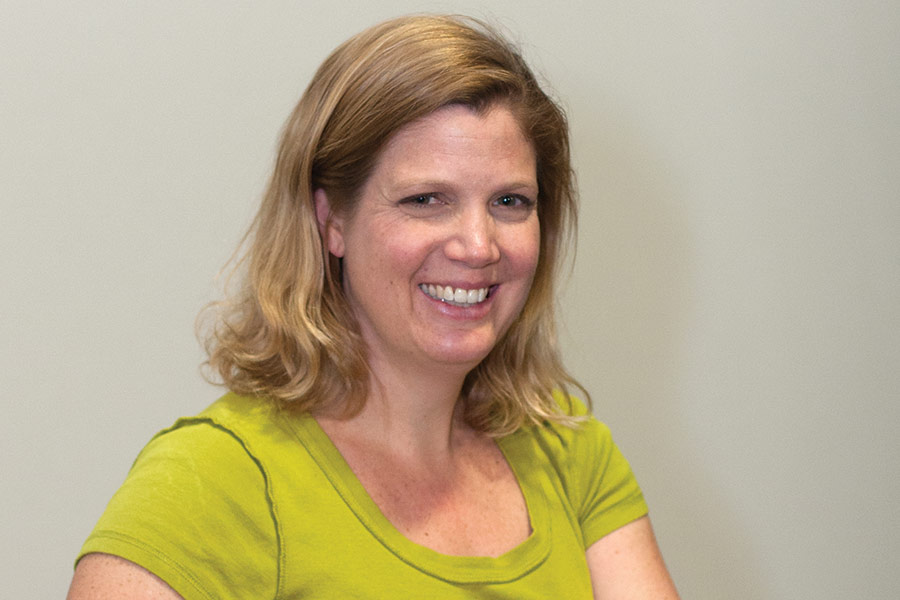
Professor and Chair of Dance Jennifer Smith
At Knox since 1997, Jennifer earned her master’s of fine arts from the University of Wisconsin-Milwaukee, and both her master of arts and bachelor’s degrees from Columbia College. Her current research is in Dance in the African Diaspora, specifically, focused on examining the cultural and artistic history of New Orleans and the role this city has played in the development of American vernacular dance forms. She has been honored with numerous awards such as the Philip Green Wright-Lombard College Prize for Distinguished Teaching in 2003, and was named one of “30 Young Show-Stoppers under 30” by the Chicago Tribune in 1999.
What is your most memorable moment at Knox?
I don't think I can pick just one. I would rather talk about my most favorite time of the year, which is when I get to produce the spring dance concert. Seriously, with each and every concert I am in awe of what my dance students present on stage, both as performers and as choreographers. When I look at the development of the dance program over the years and see how each concert grew in size and caliber, I feel truly blessed to have the job that I do!
What was something that surprised you during remote teaching?
That you can really teach people to dance remotely! Through the medium of video, I was able to connect to my students on a one-to-one, personal level that I don't always get to during a group class in the dance studio. When my students submitted recorded dance projects, I was able to focus all my attention on just one student at a time, and this granted me the ability to provide unique, personal feedback. I actually plan to take some of the video projects that I had my students do this past year and incorporate them in future classes as they ended up being great tools for teaching. I do however really miss teaching dance in the studio as so much energy comes from experiencing it live and in the moment. I also can't wait to finally choreograph using physical contact/partnering again!
If you weren't a professor, what would you be?
An adventure travel guide/leader.
Is there anything else you'd like to add?
I adopted a dog during the pandemic. She's awesome.
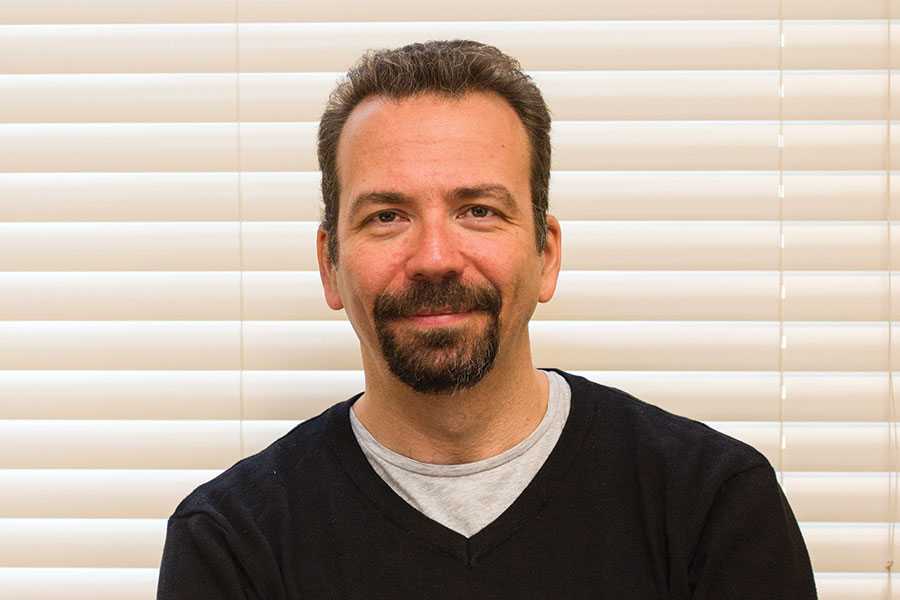
Professor of History Emre Sencer
A native of Istanbul, Turkey, Emre has been at Knox since 2008. He received his Ph.D. in history from Ohio State University. He is a specialist in modern European history, particularly the 19th and 20th century in Germany and Central Europe. He teaches courses on the modern Middle East and Turkey. For the last few years, he has been expanding his research area to East Central Europe during the First World War and immediately after. A result of that was a volume titled Central Powers in Russia’s Great War and Revolution, co-edited with John Deak and Heather Perry. Another recent volume was the product of a series of conferences held at Knox, titled Expeditionary Forces in the First World War, co-edited with Alan Beyerchen. Along with his Knox colleague Todd Heidt, associate professor of modern languages-German, and Claudia Kost, he co-authored a German cultural history reader, Ekstase und Elend.
All of these projects directly stemmed out of my teaching interests. The question of making the material comprehensible to the students is always present in research as well. I was also a Fulbright Scholar in Odessa, Ukraine, during 2018-19, and teaching Ukrainian undergraduates (a different cultural and educational environment) helped put that connection between research and teaching in a deeper perspective.
How did the restraints of the pandemic encourage growth for you as a person and as a professor?
As with most people, the pandemic hampered my academic activities. However, it also taught me to slow down and appreciate the connections that I have with people. In addition, the situation pushed me to be kinder and more understanding toward those around me, I hope. Making the most of good moments in life and nurturing the threads that keep us together were some of the lessons that I got out of the last couple of years.
If money and time were no object, what projects would you pursue (as a teacher and/or scholar)?
I would probably branch out to a different region (although in the same period of interest: the first half of the 20th century), and learn additional languages to conduct comparative research (perhaps Japanese or Chinese, for example).
What is your favorite thing about Galesburg?
I think the best thing about Galesburg is its small size. Easy to get around, with little traffic and no problems with parking. I’m originally from Istanbul, a mega city with chaotic traffic.
What is your memorable moment at Knox?
A few years ago a group of graduating seniors produced a bingo game board, based on my comments and quirks in the classroom. I was very touched that they took the time to present that as a parting gift. I considered that the greatest accolade!
What was something that surprised you during remote teaching?
I was very proud of the resilience and fortitude of our students during the period of online teaching. And this also goes for our faculty and staff as well of course.
If you weren't a professor, what would you be?
Probably some sort of a lawyer or activist, preferably in the area of human rights.
Is there anything else you'd like to add?
I feel privileged to be a part of the Knox faculty. And I hope to continue contributing to the Knox community in the future.